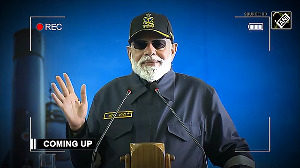In a huge blow to Shane Warne's cricketing career, the Australian Cricket Board has said the leg spinner faced it's most serious charge of doping and would be banned for a minimum of two years if found guilty.
It was earlier thought that if Warne, whose 'B' sample will be tested on Friday, could prove 'mitigating circumstances'
he could escape with a three-month ban, but the ACB has now hardened its stand.
Warne could have been charged in two ways by ACB -- using a 'prohibited substance' which, in the case of diuretics,
would have attracted a maximum ban of three months or using a 'prohibited method' which has a minimum two-year ban for the first offence.
The ACB's decision to take a hardline stand and charge Warne with a 'breach of clause 4.1b of the ACB anti-doping
policy - use of a prohibited method', was taken after the approval of its chief executive James Sutherland, the Sydney
Morning Herald reported on Friday.
The charge is severe because it considers that the diuretic was used to alter the integrity and validity of Warne's drug sample.
Under the ACB policy, the mere presence of the diuretic is enough to constitute an offence and Warne's motive for taking the drug is irrelevant.
Warne was forced to return home from the World Cup in South Africa this week after it was revealed that the 'A'
sample of his urine, tested in January, had tested positive for a banned diuretic.
On Thursday night, Warne's lawyer Ian McCubbin said Warne would be unable to challenge the imposition of the more serious charge.
Warne has denied taking the diuretic for masking other drugs, but he has not yet explained why he did take it. All
that he has confirmed is that his mother Brigitte gave him the tablet on January 22 before he announced his decision to
retire from one-day cricket after the World Cup.
The bowler had earlier said he was hopeful of returning to South Africa to play a part in the World Cup, but that
seems increasingly unlikely. The drugs hearing, which will determine his guilt and the length of the ban, was to start on Friday but now it appears, it may not be held for another week.
The Australian Sports Drug Agency (ASDA) said it was ready to take part in the hearing as early as Friday night if Warne wanted it to, but it appears Warne is now carefully considering his strategy.
Warne has the option of taking another seven days to prepare his submission before the drugs hearing.
Along with his reputation, Warne's ACB contract, believed to be worth $400,000 a year, hangs in balance and if proved guilty, he will have to forfeit $60-70,000 in World Cup match fees.
Meanwhile, details of how Warne took the 'piss pill' are now emerging.
The Daily Telegraph on Friday reported that his mother Brigitte and father Keitew were in Sydney on January 22 to be with the leg spinner when he announced his retirement from one-day cricket.
A conversation between Warne and his 56-year-old mother is believed to have prompted the cricketer to take a tablet to make him 'look nice' during the televised press conference.
Friends say Mrs Warne often nagged her son about his appearance and, like any mother, she wanted him to 'look his
best'.
Later that day, Warne submitted his urine sample to the ASDA.
Athletes who are subject to testing procedures must 'disclose any medications you have taken over the last seven
days or any medication that might be in your system at the time of testing'.
Warne, however, did not do so.
While Warne's 'B' sample was frozen with the seal intact, scientists at the ASDA laboratory opened his 'A' sample and
divided it into a number of sub-samples, which then were subjected to a string of screening tests.
The preliminary tests uncovered an anomaly in Warne's sample, leading to further specific tests, which unequivocally
confirmed the presence of diuretics in his system.





